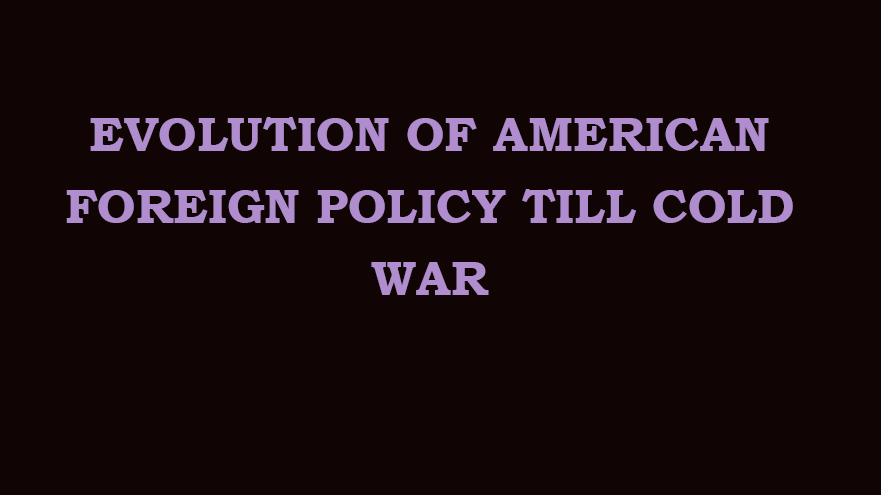
EVOLUTION OF AMERICAN FOREIGN POLICY TILL COLD WAR
THE HISTORICAL EXPERIENCE OF THE U. S. FROM ITS FOREIGN RELATIONS - AMERICA’S EXPERIENCE IN FOREIGN POLICY UNTIL 1914
The U.S. declared its independence from Great Britain in 1776. The immediate concern of the new Republic was establishing the viability its independence by avoiding entanglements in European wars and reducing dangers from the boarding European colonies which were hostile to its Republic principles. In 1778 the U.S. secured aid and alliance with France and thus ensured its independence. But in 1796 President George Washington advocates abstention from permanent alliances in foreign affairs. In his farewell address of september17, 1796 Washington said: “The great rule of conduct for as us in regard to foreign nations is, in extended our commercial relations to have with them as little political connection as possible… Europe has set of primary interests which to us have none or a very remote relation. Hence, she must be engaged in frequent controversies, the causes of which are essentially foreign tour our concern…. Out detached and distant situation invites and enables us to pursue a different course…. It is our true policy to steer clear of permanent alliance with any portion of the foreign world….” (H.S. Commager. (ed). op. cit. P. 174).
This rule of conduct was considered as an article of faith by succeeding generation of Americans. They believe that their interests could only be damaged by excessive contact with the outside world. The geographical location the U.S. and great wealth of natural resources within its boundaries provided the basis for such an interpretation of national interest. Situated between two great oceans, its security could be ensured in those times by remaining aloof from foreign entanglements. As the U.S was surrounded by the colonial territories of the great European powers, it could ensure its security only by insulating itself from the European influences. On the other hand, it could achieve its well- being by exploiting the natural resources available within its boundaries looking for commercial opportunities for trading in a free world market. Thus, isolationism could serve best the interests of the Republic in its early years.
Though the U.S. severed its alliance with France in 1800, in order to abstain from permanent alliances and entanglements in foreign affairs, it had to enter in to war with Great Britain in 1812. The continental expansion of U.S. went on by purchasing the colonial territories of the European powers. Still there was threat to the U.S. security from European intervention. Hence in his annual message to Congress on December 2, 1823 President Monroe declared that “The American continents by the free and independent condition which have assumed and maintain, are hence forth not to be considered as subjects for future colonization by any European powers … that we should consider any attempt on their part to extend their system to any portion of this hemisphere as dangerous to our Pease and safety … our policy in regard to Europe… is not to interfere in the internal concerns of any of its powers” (Ibid. PP. 236- 237).
The intention of the U.S. to abstain from the European politics and to keep Europe out of the American hemisphere was a continuation and extension of its isolationist policies. (See D. Perkins. A History of the Monroe Doctrine. London: Longman’s Green and Co. Ltd., 1960 PP. 4-7). Great Britain’s support to the U.S. policy was expressed in the British attitude towards Monroe doctrine. The doctrine helped the U.S. to concentrate on matters related to its domestic development. Thus the U.S. could direct its energies to and unexploited on continent aimed at consolidating itself through the policy of continental expansion and development of its own resources. The U.S. witnessed phenomenal economic growth during the post Monroe doctrine period. Thus, the policy of isolating itself from the European power politics suited best for the U.S. interests for a long time.
But with the closing of the American frontier and the rise aggressive imperialisms in Europe and Asia, the isolationist polices were insufficient to meet the American interests when the continent was settled and the home market saturated more and more foreign involvement became necessary. By 1890 American industrialist began to look for new foreign market sort political assistance for securing them. Moreover, the rise of Germany and Japan endangered American security by threatening to put an end to the British naval supremacy. In this context the major objectives of the U.S. foreign policy became security against any possible aggression, access to markets in other parts of the world, and extension of the democratic institutions throughout the world. In order to attain these objectives a new direction in the foreign policy had to initiated. The Spanish- American war of 1898 introduced the U.S as a world power. As a result of the war the U.S. annexed Puerto Rico, the Philippines and Guam and established a protectorate over the newly liberated Cubans. After the war, the Caribbean became an American spear of influence and was considered as part of the American defense system. The American investment in the Caribbean and South America began to increase considerably. Thus, American interests began to grow outside its boundaries. During the 1890s the U.S. government also tried to lay foundations of its Far Eastern policy through its ‘Open Door’ notes of 1897 and 1900. The U.S. government declared that China should not be carved into colonies and spheres of influence by imperialist powers. The Open-door policy was gradually used as a measure of defense especially to oppose the Japanese penetration to China, rather than developing important economic connections with China.
AMERICA’S FOREIGN POLICY EXPERIENCE FROM FIRST AND SECOND WORLD WARS
At the outbreak of the First World War, initially the U.S. declared its neutrality. But gradually it came to the conclusion that a German victory would be a threat to the American security. Hence, when the American interests were undermined by the violation of the freedom of the seas and neutral trading rights by Germany, America declared war against Germany. Though the American participation in the war was relatively unimportant, its economic aid to the allies was of decisive effect. After the war, though the League of Nations, which President Wilson had strongly promoted, came into existence, Congress was not willing to participate in it. Thus, after the war America returned to isolationism. In the 1920s and 1930s, the U.S. did not respond effectively to the aggressive policies of Germany and Japan, since they did not pose any direct threat to the U.S. Hence as the aggressors were not prevented at the outset, they were encouraged by their successes. But gradually the U.S. perceived threat in the ambition of the Axis powers. According to the U.S. perception, the German control of the Eastern Atlantic and the Japanese control of the Western Pacific would destroy American security and compel Americans to devote most of their energies to defense. Moreover, the economic policies of the German and Japanese governments would dictate their own terms to American traders and would exclude them from foreign markets. The US policy makers felt that such a German and Japanese domination would undermine the American democracy. Hence the US considered it imperative to prevent Germany and Japan from destroying their opponents in Europe and Asia. Thus, the US began supplying food stuffs and munitions to the allies. The December 7, 1941 Pearl Harbor raid by Japan put the U.S. fully into the war, the U.S. participation in the war was decisive in defeating the Axis powers (For details see W. Heinrichs. Threshold of War Franklin D. Roosevelt and American Entry into World War II. New York: Oxford University Press, 1988).
Thus, though the U.S. was reluctant to enter into both the world wars ultimately it had to defend its national security through military involvement. The U.S. realized from its experience that its own security and well-being were inseparable from that of other nations. Arresting aggression anywhere at the earliest began to be considered as essential for its own national security. Thus, gradually the U.S. tended to direct the events in its own choosing instead of waiting for them. It began to express its willingness to assume greater responsibilities in world affairs. Thus in 1943, the Senate emphasized the need of establishing “at the earliest practicable date a general international organization based on the principle of sovereign equality of all peace-loving states, and open to membership to all such states, large and small, for the maintenance of international peace and security” (Congressional Record. 78th Cong. Ist sess. November 5, 1943. P.19222)
Moreover, in the Moscow declaration of 1943, along with the major allies, the U.S. expressed its willingness to participate in establishing an international organization, for the maintenance of peace and security for the U.S. All these represented a commitment to accept the responsibilities of continuous international cooperation. The U.S. was convinced that international cooperation was essential for its own national interest in the emerging world conditions. Thus, isolation as a policy was rejected. On January 6, 1945 President Roosevelt urged the need for greater participation in the world affairs, saying that “Perfectionism, no less than isolationism or imperialism or power politics may obstruct the path to international peace. Let us not forget that the retreat to isolationism a quarter of a century ago was started not by a direct attack against international cooperation, but against the alleged imperfections, of peace. In our disillusionment after the last war we preferred international anarchy to international cooperation with nations which did not see and think exactly as we did. We gave up the hope of gradually achieving a better peace because we had not the courage to fulfill our responsibilities in an admittedly imperfect world. We must not let that happen again or we shall follow the same tragic road again-the road to a third world war. We can fulfill our responsibilities for maintaining the security of our own country only by exercising our power and our influence to achieve the principles in which we believe and for which we have fought” (The public Papers and addresses of Franklin D. Roosevelt. 1941-45. New York: Russel and Russel, 1950. pp. 498-499).
Thus, in the early months of 1945, the basic framework for the post war U.S. foreign policy was formulated. Thus, based on their experience the Second World War the American policy makers were convinced that they could not compromise with aggressors. They believed that the war was invited by the British and French appeasement of Hitler (See T. Taylor. Munich: The Price of Peace. New York: Doubleday and Company Inc., 1979). Hence the American decision makers concluded that aggression had to be arrested at the earliest for preventing any further aggression. In this context the Soviet and Chinese communism appeared to the American policy makers as “red fascism” which threatened the ‘free world’ states in the same aggressive way as Nazism had (For details see. L.K. Adler and T.G. Peterson. “Red fascism: The Merger of Nazi Germany and Soviet Russia in the American Image of Totalitarianism” American Historical Review.75 (April 1970) pp.1046-1064). Germany, Nazism and Hitler had been replaced by the Soviet Union, communism and Stalin as a threat to the peace and security of the ‘free world’. Totalitarian states were considered as inherently aggressive. The failure to stand up to the aggressive totalitarian states was believed to have resulted in the Second World War. Hence the American policy makers believed that the lessons of the Second World War had to be applied to meet the ‘communist danger’ during the post war period. According to the Secretary of State Dean Rusk, the clearest lesson of the 1930s and 1940s was that “aggression feeds on aggression. I am aware that Mao and Ho Chi Minh are not Hitler and Mussolini. But we should not forget what we have learned about the anatomy and physiology of aggression. We ought to know better, than to ignore the aggressor’s openly proclaimed intentions or to fall victim to the notion that he will stop if you let him have just one more bite or speak to him a little more gently” (Quoted in J P Kimball. To Reason Why: The Debate about the Causes of U.S. Involvement in the Vietnam War. Philadelphia: Temple University Press, 1990. p 67)
Hence the American decision makers believed that communist aggression anywhere in the world had to be contained and rolled back. Thus, the images of the 1930s were dominant factors which influenced the U.S. perception of the post war situation especially, the situation in Vietnam.
Thus, the historical consciousness of the people of the U.S. and also the perpetual predisposition of the decision makers of the U.S. as was delineated in this chapter are essential for understanding and explaining the decisions and actions of the American policy makers during the post war period. The details of the American perception of communism as a threat are dealt with in the following section.
AMERICAN IDEOLOGY IN COLDWAR
In analyzing the American foreign policy of Vietnam War, it is essential to study the historical consciousness of the people of the U.S. This is because the perceptions of the U.S. decision makers about the situation in Vietnam were determined by the historical consciousness of the U.S. The decision makers, as member of the society, shared the prepossessions and predispositions of the society and made their perceptions about international communism and the specific situation in Vietnam through the prism of their historical consciousness. The historical consciousness of the people of the U.S. is studied by tracing their national experience of settling a vast continent by people of various ethnic origins, their religious experience, their political beliefs, values, expectations and their experience in foreign relations. The American culture is largely the product of interplay between the two major factors such as the inheritance, impulses and aspirations of the people of various races from different countries who arrived in America and the influences of the American national environment upon the people who arrived there. Improving the economic fortunes was the major impulse for immigration. The immigrants came to a huge, wild country rich with natural resources. Though the immigrants were few in number, the land available was in abundance. This combination of unutilized resources and the people with the incentive to use them shaped the social environment of the pioneer communities. The settlement of the frontier was a selective process. The frontier appealed more to the restless, ambitious and adventurous men of action. The abundance of land and resources made the settling easier and rewarding. Moreover, it facilitated the growth of individual freedom and social equality and promoted the attitudes of optimism and self-assurance. The westward expansion expanded the belief in popular rule and accelerated the trend towards social and political democracy. The social characteristics associated with the frontier tradition include optimism, materialism, competitiveness, equalitarianism and individualism. The frontiersman was mobile, versatile, inventive, wasteful and nationalistic. He scorned precedents and traditions. He was a practical opportunist concerned primarily with devising habits and institutions that would allow him to utilize most effectively the abundant available resources. Wealth and prestige were considered as desirable goods. No one wanted to see competition limited or equality institutionalized. Everyone wanted to be free from any interference and no one felt the need for any government. But the War of Independence convinced the American people about the need for a strong government. This attitude helped the formation of a federal constitution. The constitution drafted by the Philadelphia Convention of 1787 was based on aristocratic and capitalistic principles. Hence while the aristocratic and moneyed classes unanimously supported the constitution, the agrarians opposed it. But the ultimate defeat of agrarianism was inevitable since men who were agrarians by conviction, not by expediency were rare. The austerity and self-discipline that agrarianism required were wholly contrary to the dynamic quality of will which characterized the American civilization in general. Hence as the Americans could not be content with the relatively static economy, they preferred the rewards and hazards of industrial capitalism. The Americans believed that the state should protect the property rights and that it should protect the property rights and that it should promote economic opportunity and free enterprise. Thus, ultimately the American economic system became capitalistic.
Christianity had great impact on the lives of Americans from the early days of settling. The American colonies were influenced by Protestantism through the Puritan movement. The Puritans believed that they were the chosen people of God commissioned to fulfill the great mission in the world. They accepted Bible alone as their guide. Puritan character was a mixture of practicality and faith in the power of God. Puritans believed that they should serve God by following an occupation that served the world. It emphasized the ideals of respect for the individual and for the dignity of man, recognition of the ultimate authority of reason and allegiance to principles rather than to persons and to the doctrine of government by compact and by consent and to spiritual and moral democracy. The theology that most satisfactorily met the Puritan culture’s sense of affairs was that of John Calvin. The Calvinists believed that God was the absolute sovereign ruler of all creations and accepted Bible alone as their guide. The core of Calvinism was man’s sense of his own sinfulness and his consequent anxiety and fear of divine anger. Humans could do nothing to promote their salvation. The only hope was the grace of God. It believed in salvation by faith. It ensured that the man who trusted in the grace of God and the atonement made by Jesus on the Cross need no longer feel any anxiety on account of his sinfulness. Calvinism divided mankind into two groups: the elect and the damned. Those who had faith in God and obeyed the moral rules established by God might feel assured of their election. The rest of the mankind was damned. The Calvinist considered America as are redeemer nation. They considered if as the duty of the elect to impose their way of life upon the damned in order to see that the will of God was obeyed. There is relationship between the American religious experience and the success of democracy. The religious beliefs of the people of U.S. reinforced the values that determined the political goals. The two basic concepts of Christian belief such as sin and soul were helpful in promoting political equalitarianism and individualism in America. The dissenting pluralist tradition in religion strongly influenced the formation of a tradition of political dissent. The basic ideas of American political creed included equality, liberty, individualism, constitutionalism and democracy.
The major value orientations of the American culture included activity and work, achievement and success, moral orientation, humanitarianism, efficiency and practicality, science and secular rationality, material comfort, progress, equality, freedom, democracy, external conformity, nationalism, patriotism, individual personality racism and related group superiority themes. Americans believed in the ethical or fundamental equality of all but had contempt for the theory of permanent equality of property. The basic objective of the U.S. policy was to defend and promote the fundamental values of the U.S. society. The fundamental purpose of the U.S. was to assure the integrity and vitality of its free society founded upon the dignity and worth of the individual.
What the Americans had in common was only the American creed which included the political ideas of equality, liberty, individualism, constitutionalism and democracy. The American creed constituted the very basis of the American national identity. The national identity and the national existence were closely related to the adherence to the political ideals of the American creed. Hence the disillusionment with the political ideals of the American creed could threaten the national existence of the U.S. Americans believed that communism was a threat to their basic political ideals. Hence during the post war period, the American people began to perceive a grave threat to their welfare and national security from the communist expansionist tendencies under the leadership of Soviet Union and China.
Isolationism served best the interests of the Republic in its early years. The Americans believed that their interests could only be damaged by excessive contact with the outside world. The geographic location of the U.S. and the great wealth of natural resources within its boundaries provided the basis for such an interpretation of national interest. But with the closing of the frontier, saturation of the home market and the rise of aggressive imperialism in Europe and Asia, more and more foreign involvement became necessary for the U.S. Thus, gradually American interests began to grow outside its boundaries. The post war U.S. foreign policy was greatly determined by the U.S. experience in the First and Second World Wars. Though the U.S. was reluctant to enter into both the World wars ultimately it had to defend its national security through military involvement. Thus the U.S. realized that its own security and well-being were inseparable from that of the other nations. Thus, arresting aggression anywhere at the earliest began to be considered as essential for its own national security. Hence the U.S. began to express its willingness to assume greater responsibilities in world affairs. Thus, gradually the U.S. tended to direct the events in its own choosing instead of waiting for them.
Such economic, religious, political and foreign policy beliefs, values, habits and expectations constituted the historical consciousness of the U.S. This particular historical consciousness of the U.S. determined its perceptions about the post war world scenario.



